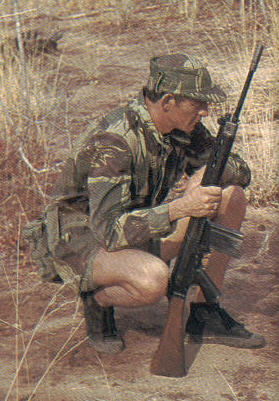This is some old school Soldier of Fortune material, but still really good. The Tracker Combat Units in Rhodesia were impressive, and as you can see below, this unit produce some interesting folks for their war. In particular, Andre Rabie and Allan Franklen, both founding members of the Selous Scouts.
And just so we don’t forget, I talked about David Scott-Donelan’s school awhile back and how important these combat tracking skills are.
The one point that really struck me, was this quote ‘troop strength was low and resources to patrol a 1,000-mile border and 150,000 square miles of hinterland were severely limited’. Boy that sounds like the US/Mexico border, the Saudi/Yemen border, the Afghanistan/Pakistan border, the Iraq borders, etc., etc., etc…..
In a world where manpower and resources are hard to come by and terrorists and criminals exploit miles of borderland to accomplish their deeds, the solutions that the Rhodesians came to are more relevant today than they ever were before. They were forced to do border stuff on the cheap, and developing a combat tracking capability was the outcome of that.
I also got a kick out of the similarities between the old west, and Rhodesia’s war. We used Indian Scouts and Mountain Men to do just what these guys were doing, and that is tracking humans. Why we are not emphasizing the use of more of these tracker teams in places like Afghanistan, is beyond me. As long as this war has been going on, there should have been entire schools in place over in Afghanistan, whom have produced hundreds of competent man trackers and scouts for that war. Where are the Jezailchis Scouts and why are we not learning from the lessons of others in this current war? –Matt
Edit: David Scott-Donelan is no longer associated with TTOS, and his new school is called The Scott-Donelan Tracking School. His website is located here.
——————————————————————

Tracker Combat Unit (TCU) Trails Terrs
Soldier of Fortune Magazine
March 1985
By David Scott-Donelan
Rhodesia was hardly a nurturing environment for an experimental military unit. Most soldiers were concerned with simple survival, particularly in the earlier days of the country’s no-holds-barred bush war against communist guerrillas. In those times, the government’s troop strength was low and resources to patrol a 1,000-mile border and 150,000 square miles of hinterland were severely limited.
But history demonstrates some of the toughest life forms spring from harsh environments. In Rhodesia, when you talked tough, you talked about the Army’s Tracker Combat Unit.
From TCU’s small nucleus of original members came an impressive roster of military leaders including Andre Rabie and Allan Franklin, founding members of another innovative and deadly organization, the Selous Scouts. Other original TCU members included Brian Robinson, who later commanded Rhodesia’s Tracking School and Special Air Services at the height of battlefield commitment of that unit. TCU plankowner Joe Conway was decorated for tackling four terrorists while armed only with a bayonet. And ‘T.C.” Woods survived an underwater battle with a crocodile, even after the man-eater chewed off one of his balls. The original members of the Tracker Combat Unit were veterans and genuine hard-cases. They had to be.